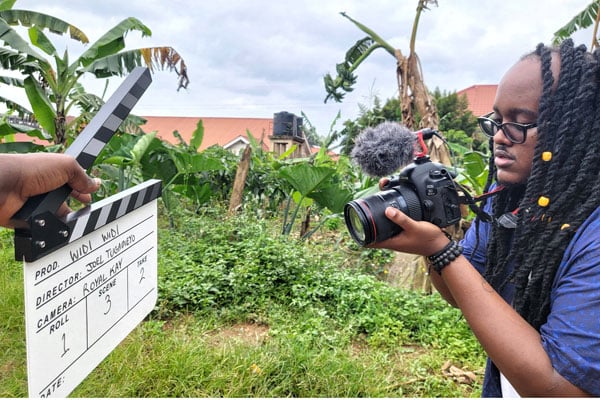Prime
Dr Musenero: fighting Ebola in Sierra Leone

Dr Monica Musenero. COURTESY PHOTO
What you need to know:
- Dr Monica Masanza Musenero left the comfort of her home and job as an assistant commissioner-epidemiology, and surveillance at the Ministry of Health in Uganda to go to Sierra Leone and join the fight against an Ebola outbreak in 2014.
In Sierra Leone, the title ‘Kornya’ means female warrior. That is the title Dr Monica Masanza Musenero was given after she left the safety of her home (Uganda) and went to Ebola ridden Sierra Leone to help fight the disease in 2014.
Dr Musenero, a Ugandan doctor born in a remote village of Petete, Petete sub-county in Butebo District was recriuited to offer technical advice in West Africa because of her experience in handling the disease.
The outbreak
According to www.worldvision.org, the 2014 outbreak of Ebola virus in West Africa was the “largest, most severe and most complex Ebola epidemic” in history. More than 28,000 people were infected, and 11,000 people died before the international public health emergency ended in 2016.
Most of the cases occurred in three countries: Guinea, Sierra Leone, and Liberia. Without an effective early-warning system, the disease spread rapidly within the region, revealing the failures of disjointed and under-resourced healthcare systems.
Sierra Leone’s health system was ill-prepared to address the overwhelming number of cases. By March 2016, the World Health Organisation had documented a total of 14,124 cases, including 3,955 deaths, in Sierra Leone more than any other country.
Relocating to Sierra Leone
Before relocating to Sierra Leone, Dr Musenero was working at the Ministry of Health [as assistant commissioner-epidemiology, and surveillance] and had gained experience during the ebola outbreak of 2007 in Bundibugyo District.
“I thought I would be there to give technical support and advise for only three weeks but this was not to be. When I arrived in Freetown, Sierra Leone, I was unprepared for the horror I encountered. Many people were dying. I ended up staying for five months. This was between July to December 2014.” Dr Musenero says.
Musenero says in Sierra Leone, she was stationed in Kenema, which was the heart of the outbreak.
At the time of her arrival in Kenema in mid-July, Sierra Leone had registered more than 300 suspected and confirmed cases of Ebola, and of these, some were fatal and others had been laboratory confirmed. She says she discovered that the figures in the news only reflected a few cases that had been reported.
“Many were getting infected and dying and being buried before being reported. Even I was so scared because we hadn’t yet established how to stop the outbreak. Never in my life had I imagined such an epidemic,” she recounts.
It was after two weeks of surveillance that a plan was formulated.
Musenero says the Ebola epidemic was much bigger than any epidemic Sierra Leone had ever experience.
Thousands of people had died and more were still dying, health workers too.
“I remember arriving in Sierra Leone on a Monday and the following day a doctor called Khan died of Ebola. The situation worsened when many health workers out of fear left,” she says.
Getting to work.
Dr Musenero started off by building a team of 21 people, who were fully trained-surveillance officers of different professions. Contact tressers were also trained.
She gathered all the information she could find about the epidemic, strictly observed safety precautions and prayed drawing strength from the fact that many people were counting on her to help them.
“I told my team, we can’t run away or hide until the disease gets to us. Instead, let us fight back. If we die, let’s die on the frontline. And I am going to be there with you to show that I believe in the cause,” she recounts.
She said that three goals had to be set on which the team-based their intervention and among them was how to stop the virus in the first three weeks after her arrival-which indeed happened and also control infections and record every new infection.
By that time, many schools, hospitals and non-government organistions had been closed their offices because of the worrying situation.
“We had to find ways to reach decision-makers in regard to the management of the disease and resource allocation towards combating of the disease,” she says
Musenero remembers how she was denied a meeting with the leaders during a council meeting to present the right procedures to handle the epidemic. She was told her that they had a lot business to discuss.
Musenero says the epidemic was so bad that at some point, dead bodies were being picked like garbage off the street.
“We had to institute a quarantine and create simple guidelines such,” she explains
Looking back now, Dr Musenero says all the other epidemics she had been involved in fighting were training grounds preparing her for Sierra Leone.
“Ebola in Sierra Leone indeed tested every skill and character trait I have my competence, strength and technical knowledge. Thankfully by the time I left in December the area had reported no new infections and none of the people who were recruited into the surveillance and monitoring teams died,”
Lessons
Looking back now, Dr Musenero says there is need for political will towards timely declaration and management of epidemics.
She says regional and national contingency plans need to be developed and implemented, with adequate resources to prevent and react to future epidemics. There is also need to establish national and regional teams of experts who can be rapidly deployed in any emergency and community engagement for effective containment of outbreaks.
“I had to give guidance at national level on how to deal with affected districts and guide the minister on what he needed to do. What I saw in Sierra Leone was traumatising and we need to do something about it,” she stresses.
Dr Musenero also notes that there is need for the health system to be strengthened and work effectively with other sectors and areas of expertise to ensure holistically and effective responses.
“Let’s fight corruption especially during emergencies like this one. People were being paid and yet they never worked. This was quite unfortunate “she notes.
Education
Dr Musenero is a graduate of Veterinary medicine, Microbiology and Public Health from Makerere University, Cornell University in the US,O-Level at Bubulo Girls [1991-1984], A-Level at Nabumali High school [1985-1987]
Technical incompetence
Dr Musenero explaines that she was not prepared for what she found on the ground despite having experience of Ebola response in Uganda.
“The Challenge in Uganda has always been how do we manage the partners from all the over the World,” she notes
She says she has never been in a place with as low technical competences on the ground as Sierra Leone.
“In Kenema, there was no one to work with.The community did not know the disease and the country’s level of competence and capacity in general public health was not capable of control ling the disease.




